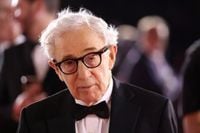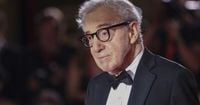On August 24, 2025, the world of cinema found itself at the center of a geopolitical storm when renowned American filmmaker Woody Allen made a virtual appearance at the Moscow International Film Week. Allen, now 89, joined the festival remotely in a session moderated by Fyodor Bondarchuk, a well-known Russian director and long-time political ally of President Vladimir Putin. The event, which billed Allen as one of its headliners alongside Serbian director Emir Kusturica and American actor Mark Dacascos, immediately sparked outrage far beyond the film community.
Ukraine’s Ministry of Foreign Affairs wasted no time in issuing a fierce condemnation. In a statement released on August 25, the ministry declared, “Woody Allen’s participation in the Moscow International Film Week is a disgrace and an insult to the sacrifice of Ukrainian actors and filmmakers who have been killed or injured by Russian war criminals in their ongoing war against Ukraine.” The ministry went further, accusing Allen of “turning a blind eye to the atrocities Russia commits in Ukraine every single day for 11 years now.” According to Ukraine, his participation lent credibility to a festival that “brings together Putin’s supporters and voices,” and they warned that “culture must never be used to whitewash crimes or serve as a propaganda tool.”
Allen’s appearance at the festival was not without context. Russian media broadcast footage of the filmmaker addressing a packed Moscow theater from a massive screen, recounting his longstanding admiration for Russian cinema and his experiences visiting both Russia and the former Soviet Union. During the session, Allen praised the 1965 four-film adaptation of War and Peace by Sergei Bondarchuk, calling it one of his favorite works of cinema. “I have been to Moscow and St Petersburg. I’ve always liked Russian cinema. I had the pleasure of meeting Sergei Bondarchuk a few years ago in New York. I watched the Russian film War and Peace which is almost seven hours long. I watched it in one day,” Allen said, according to a translation from RIA Novosti reported by The Independent.
He even hinted at the possibility of working in Russia, stating, “If there were similar proposals, I would sit down and think about what the script could be about how well you feel in Moscow and St Petersburg.” This openness to collaboration, especially in the current climate, was seen by many as controversial, given the ongoing conflict and the festival’s connections to the Kremlin.
Allen’s participation quickly put him at odds with much of the Hollywood establishment, which has largely rallied behind Ukraine since Russia’s full-scale invasion began over three years ago. Prominent actors have signed on to Ukraine’s United24 crowdfunding initiative, and President Volodymyr Zelenskyy himself has made virtual appearances at major Western award ceremonies, including the Golden Globes and the Grammys. The optics of Allen’s involvement with a festival seen as sympathetic to Putin’s regime were therefore especially fraught.
In response to the uproar, Allen released statements to both The Guardian and the Associated Press on August 25 and 27, seeking to clarify his position. He categorically rejected the idea that his appearance amounted to support for Putin or the war. “When it comes to the conflict in Ukraine, I believe strongly that Vladimir Putin is totally in the wrong. The war he has caused is appalling. But, whatever politicians have done, I don’t feel cutting off artistic conversations is ever a good way to help,” Allen insisted. He further described the war as “appalling” and stressed his opposition to the Russian president’s actions. Yet, he maintained that cultural dialogue should be preserved, arguing that “cutting off artistic conversations is never a good way to help.”
This stance has not mollified Ukrainian officials or their supporters, who view any engagement with Russian cultural institutions as a tacit endorsement of the Kremlin’s actions. The ministry’s statement was unequivocal: “We strongly condemn Woody Allen’s decision to bless Moscow’s bloody festival with his address.” The controversy has reignited a broader debate about the role of art and artists during times of conflict. Can—or should—cultural exchange continue when one side is accused of grave human rights abuses? Or does participation, however well-intentioned, risk becoming a tool of propaganda?
For Allen, the debate comes at a time when his own career has been marked by both acclaim and controversy. Once a dominant force in American cinema, his popularity has waned in recent years, partly due to renewed attention to longstanding allegations of sexual abuse from his adopted stepdaughter Dylan Farrow and the broader impact of the MeToo movement. In April 2024, after completing his 50th feature film, the French-language erotic thriller Coup de Chance, Allen openly pondered retirement. “I’m on the fence about it,” he told reporters. “The whole business has changed, and not in an appealing way. All the romance of filmmaking is gone.”
Allen’s connection to Russian culture and literature is nothing new. His 1975 comedy Love and Death famously spoofed the works of Tolstoy and other 19th-century Russian novelists, while his 1989 film Crimes and Misdemeanors echoed Dostoevsky’s themes of guilt and justice. But the current climate is a far cry from the intellectual playfulness of those earlier years. Now, every gesture and statement is weighed against the grim backdrop of war and political repression.
The Moscow International Film Week itself is a relatively new event, first held in August 2024. It is distinct from the older Moscow International Film Festival, which lost its International Federation of Film Producers Associations accreditation in 2022 following Russia’s invasion of Ukraine. The organizers have positioned the festival as a platform for dialogue and artistic celebration, but critics argue that any such event in the present context is inevitably political.
For many in Ukraine and among its international supporters, the stakes are clear. They insist that cultural figures must take a stand and that neutrality—or even the appearance of it—can be deeply damaging. For Allen and others who advocate for the preservation of artistic dialogue, the line is less clear-cut. As he put it, “Whatever politicians have done, I don’t feel cutting off artistic conversations is ever a good way to help.”
The controversy over Allen’s appearance is unlikely to be the last of its kind, as artists and institutions around the world grapple with the ethical dilemmas posed by war and authoritarianism. For now, the debate continues—on screens, in statements, and in the hearts of those who believe in the power of art to both challenge and connect.


